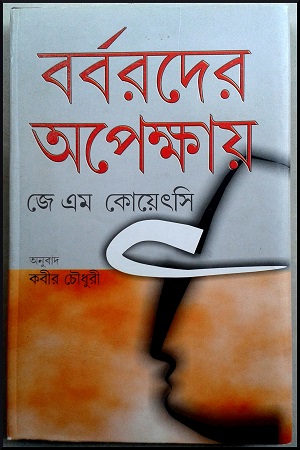Today’s guest post is written by Ms. Swagata Mukherjee, with whom I have had the good fortune to share a room for the last five months of my engineering program. Swagata is pursuing her Ph.D. in experimental high energy physics, has travelled widely and shares her travel exploits in her blog, Through My Eyes. The pictures on her blog are also mostly photographed by her. She is also passionate about books. Today, on my request, she shares with us her views on novelist J.M. Coetzee’s ‘Waiting for the Barbarians’. Thank you so much, Swagata Di, for this guest-post.
Not being a widely-read person, especially in English literature, I would have probably never come across a book written by J. M. Coetzee if a Bengali publishing house didn’t come up with a Bengali translation of some of the masterpieces of the Nobel laureate author. This year, at the Kolkata International Book Fair, when I was roaming around in different book stalls, I came across a book in the stall of “Protibhash”. In Bengali, the name of the book is “Barbarder apekkhay”, meaning, “Waiting for the Barbarians”. Until then, I did not know about the author, but something was attractive about that book and I decided to buy it.

Book cover of Bengali translated version of ‘Waiting for the Barbanians’. Translation by Kabir Chowdhury.
Image Courtesy: Swagata
“Waiting for the Barbarians” is a novel, published in the year 1980, years before I was born. The story is narrated in the first person by an unnamed magistrate of a small town which is a part of a big empire. The town is situated at the border of the empire and very near to the town there lived some tribal people who are referred to as “barbarians”. The novel describes how the tribal people are tortured by a special force sent from the capital of the empire. The magistrate knew that the tribal people are harmless and innocent, but he could hardly do anything to save them.
The fact that the name of the town is unspecified and most of the characters of this novel have no names makes so much sense – because the state-approved torture on under-privileged and innocent people is a horrifying truth in different places on earth! Also the fact that the magistrate wants to protest but fails to do so points to one of the greatest truths about ourselves that we don’t wish to confront.
One day the magistrate meets a barbarian, a young girl, who is one of the victims of the torture. The magistrate offers her to work in his house. The interaction between the girl and the magistrate reveals the psychological conflicts going on in the magistrate’s mind. Finally, the magistrate makes a difficult journey to the nearby mountain to return the girl to her own people. When he returns back to the town, he discovered that he was longer the magistrate but a prisoner who is subjected to the same torture and oppression. The empire has lost faith on him because he tried to help a barbarian.
At the end of the novel, the dwellers of the town still wait for the barbarians to invade to the town and unleash their barbarism through murders, rapes, destruction of properties. But the gang of barbarians never arrives!
As per expectation, this novel by Coetzee received the CNA Prize, James Tait Black Memorial Prize and the Geoffrey Faber Memorial Prize. So far, Coetzee has been awarded with numerous prizes, including the Nobel Prize in Literature in 2003 and the Booker Prizes in 1983 and 1999. I am looking forward to reading the other masterpieces by this celebrated author like Life & Times of Michael K, Disgrace, Age of Iron, The Master of Petersburg etc.
The End
Today marks the end of the Guest Blogs series in May on Scribbles@Arpita. I would like to extend my heartiest thanks to the bloggers who shared their thoughts through these guest-posts and made this series a success. Until next time, keep blogging and spreading your wonderful ideas!

Reblogged this on Through My Eyes and commented:
I express my heartfelt thanks to Ms. Arpita Pramanick for having me as a guest blogger on her blog Scribbles@Arpita. She is a thoughtful young lady and an aspiring author with a strong observation power. Her short story, “I am Mala” is published on eFiction magazine in the May, 2015 edition. Her first book of short stories, “Bound by Life”, will release on June 20, 2015 on Amazon Kindle. Now, I myself is quite new to writing and when she asked me to write on her blog in the Saturday-special “Guest Blog” series on “writing”, I was a bit confused about what to write! Finally I ended up reviewing a book of the celebrated author J. M. Coetzee. I hope you will like it.
LikeLike